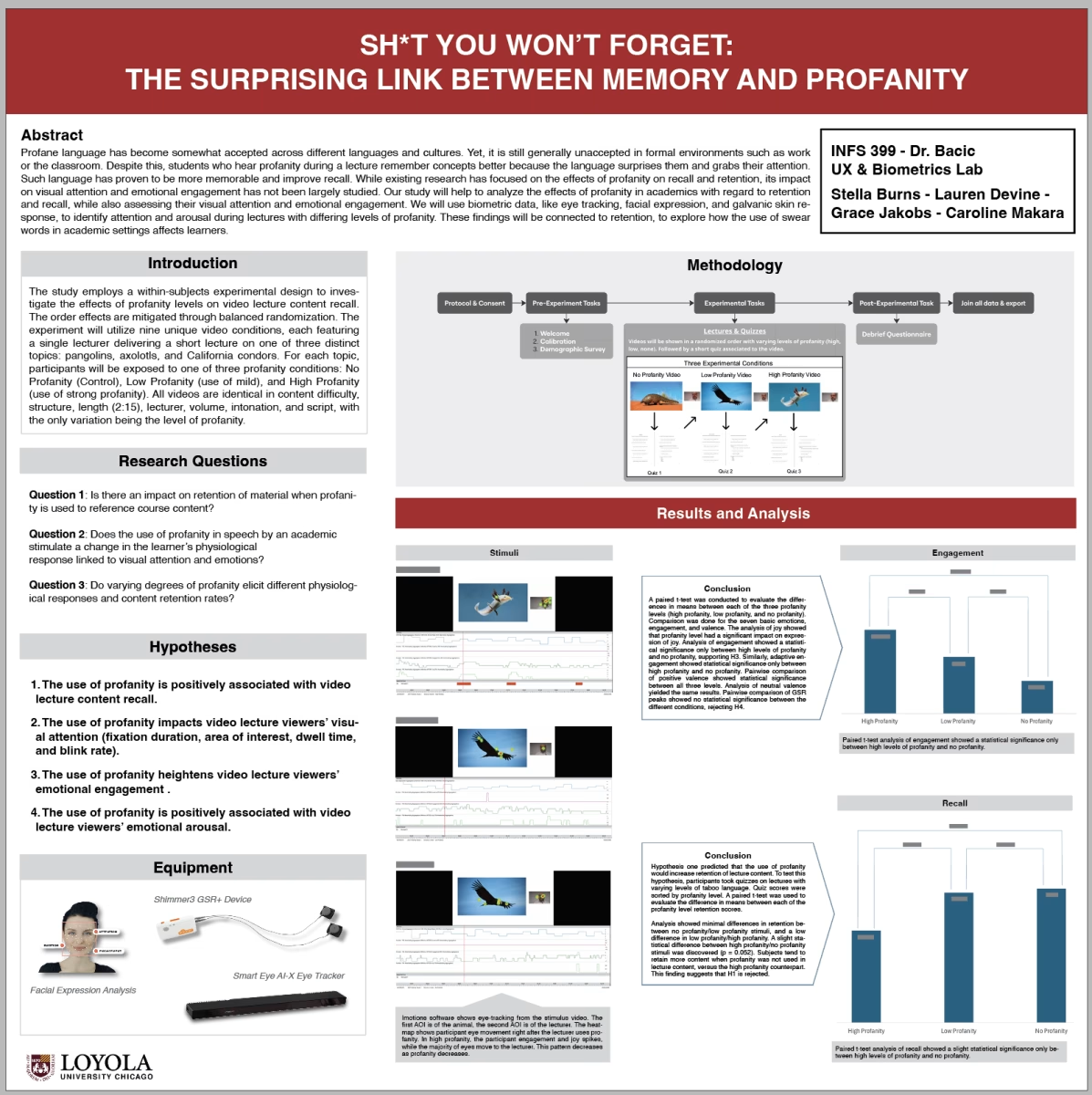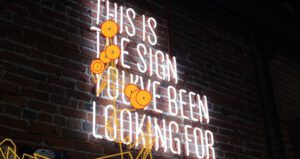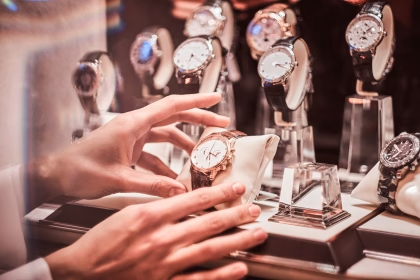“The level to which this [course] is transformational to students and the amount of knowledge that they gain throughout this process is just unbelievable.”
-Dinko Bačić, Associate Professor of Information Systems at Loyola University
Grace Jakobs, a recent Magna Cum Laude graduate from Loyola University Chicago, had never attended an academic conference and was not sure what to expect when her group’s paper submission was accepted to Americas Conference on Information Systems (AMCIS). Her group was invited to present their research, but since no one else in her group was able to attend, Grace presented the group project alone.
As she stood behind the podium, the first word on her slide was…
Sh*t
According to Grace, many audience members seemed amused, and a few were not. The research she presented at AMCIS investigated how profanity affects students’ visual attention and emotional engagement during video lectures. Their goal was to build on existing research about the effects of classroom profanity on students’ retention and recall.
“I thought it was really cool and it felt like a proud moment, because we’ve been working so hard and working for months, and we finally got to the point where we can show people. Since our topic is kind of polarizing to some people, we did get mixed reactions. We did have some people who, straight up walked away. But I was like, that’s part of it. That’s kind of the whole premise of our topic.”- Grace Jakobs, recent graduate from Loyola University
Use of profanity by public figures has been a popular news topic this year. There have been multiple news articles discussing the increasing use of profanity in American politics by both parties. Celebrities have been censored. People are divided by how they perceive the use of profanity. Research on profanity is broadly interesting and eye-catching.

But how did an undergraduate student in Fine Arts get invited to present at a conference dominated by more senior researchers in Information Systems?
Grace graduated in May 2025 with a Bachelor of Fine Arts in Visual Communications, a curious background for someone presenting at a conference in Information Systems. She minored in marketing and information systems because she felt these skills would be useful in a competitive job market.
User Experience and Biometrics Course
As part of her minor, she took “User Experience and Biometrics” with Dinko Bačić. During this course, students completed assignments using iMotions Education on their own laptops, facilitating hands-on experience with quantitative research without additional hardware. Students created studies and sent them to their classmates and friends, who participated using their own laptops. With the participants’ consent and web cameras, Grace and her classmates were able to collect and analyze eye-tracking and facial expression data related to stimuli they had created for their studies.
“I sent it to my friends and then I had to analyze the data. I remember showing them and saying, ‘I can see the outline of your face and where you’re looking’. And they thought it was so cool.”-Grace Jakobs
From there, students formed groups and chose research topics based on their own interests, with the help of their professor. They conducted a literature search, made a study plan, and applied for IRB approval. Students were then certified to use more advanced hardware in Loyola’s UX and Biometrics lab. For their profanity project, Grace and her research group used iMotions Lab, an eye tracker (Smart Eye AI-X), a GSR device (Shimmer), and facial expression analysis (iMotion’s Affectiva) on the webcam video to measure participants’ attention, arousal, and emotional expression while watching video lectures containing various levels of profanity.
Loyola’s Research Symposium
After collecting data during the course, their group presented their research during a poster session at Loyola’s 2025 Undergraduate Research and Engagement Symposium. This was Grace’s first research symposium and she was surprised by the size of the posters and the diversity of research topics, ranging from STEM, to nursing and architecture.
“Right next to my group, I forget exactly what she was studying, but she was in microbiology. It was just such a stark difference between what we were studying, the effect of profanity in video lectures. And then she’s studying like this specific organism.” -Grace Jakobs

AMCIS 2025
After the symposium, Dr. Dinko Bačić encouraged students to apply to AMCIS.
“We submitted three papers to AMCIS during the class, which is our leading information systems conference. [We submitted] before the class even finished. I’m hoping at least one of them or all three get in. They’ll be so proud, I think it’s going to make their semester.” -Dr. Dinko Bačić
Their EMF (emergent research forum) paper was one of the AMCIS 2025 Top 25% Papers, research conducted by four bachelor students and an enthusiastic professor. Overall, Grace found the experience inspiring.
“Going to the conference definitely gave me an eye-opening experience. I learned that we can research anything. Like we can do, like, anything! …But if I ever get the opportunity again to research something, I’ll be jumping right on that.” -Grace Jakobs

Grace Jakobs’ journey is one example of how immersive learning creates opportunities for undergraduate students. With a carefully constructed course, innovative and accessible technology, collaboration, and fervent mentorship, this group was able to explore a provocative topic and have experiences uncommon for undergraduate business and fine arts students. Her story highlights how tools like iMotions Education and Lab can empower students to make meaningful research contributions.





